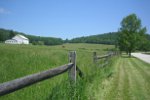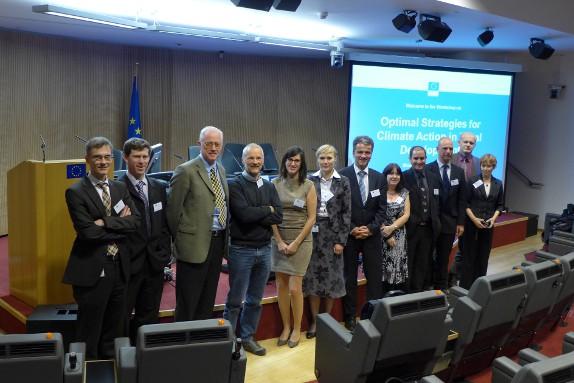<p>Stakeholders were invited to an international workshop on 22 November 2012 in Brussels on the ongoing study "Optimal Strategies for Climate Change Action in Rural Areas" (OSCAR). The study presents an OSCAR manual and a software tool, which aim to provide regional specific guidance on how to design climate change mitigation and adaptation measures in future Rural Development Programmes.</p>
- land use | reduction of gas emissions | sustainable forest management
- Thursday 22 November 2012, 01:00 (CET)
Practical information
- When
- Thursday 22 November 2012, 01:00 (CET)
- Languages
- English
Description

The workshop was organised by the European Commission's Directorate-General for Climate Action (DG CLIMA), which initiated the study, in collaboration with the team of researchers led by the Agriculture and Environment Research Unit at the University of Hertfordshire, UK.
Negotiations are under way on a further reform of the Common Agricultural Policy for the 2014-2020 programming period. In terms of mainstreaming climate action into European policy areas, one of the priorities of the EU's rural development policy post-2013 is to support a shift towards a low carbon and climate resilient economy in the agriculture, food and forestry sectors through the promotion of resource efficiency. For the new Rural Development Programme (RDP) this presents an opportunity to develop a more holistic approach that not only tackles rural issues but also addresses climate change mitigation and adaptation.
Given the need to mainstream climate action into all EU policy areas including rural development, DG CLIMA initiated the OSCAR project to provide guidance for Member States and stakeholders involved in the programming process on how to design climate change mitigation and adaptation measures at programme level.
The OSCAR study is developing and applying a conceptual framework that enables the assessment of the contribution that each RDP measure and operation makes towards climate change using four criteria: mitigation, adaptation, productivity and practicality (MAPP).
Regional variation categories (RCVs) have been generated using geographical information system (GIS) techniques based on factors that can affect greenhouse gas emissions, mitigation potential and adaptive capacity. Outputs from the MAPP analysis are stored in a database that ranks them according to their benefits for mitigation and adaptation. This information is being offered to Member States in the form of a manual, a checklist and a software database, to be used when developing their own RDP activities.
Read More
Useful documents
Presentations
- Welcome & Global climate challenges and one of the EU's responses - Peter Wehrheim, Head of Unit "Climate Finance and Deforestation", DG Climate Action
- Mainstreaming climate action into the future EU's rural development policy - Josefine Loriz-Hoffmann, Head of Unit "Consistency of Rural Development", DG Agriculture and Rural Development
- Adaptation measures in post 2013 rural development programmes - Rosario Bento Pais, Head of Unit "Adaptation", DG Climate Action
- Introduction and overview of the OSCAR Study - Kathy Lewis, Research Leader "Agriculture & Environment Research Unit", University of Hertfordshire, UK
- Technical presentation of the OSCAR Study and software demonstration – John Tzilivakis, Senior Research Fellow "Agriculture & Environment Research Unit", University of Hertfordshire, UK
- Presentation of case study France - Charlotte Bordet, Agriculture department, Solagro, France
- Presentation of case study Poland - Wieslaw Fialkiewicz, Assistant Professor "Institute of Environmental Engineering" Wroclaw University of Environmental and Life Sciences, Poland
- Presentation of case study United Kingdom - Doug Warner, Senior Research Fellow "Agriculture & Environment Research Unit", University of Hertfordshire, UK
- Closing remarks - What does mainstreaming of climate actions into rural development mean? - Peter Wehrheim, Head of Unit "Climate Finance and Deforestation", DG Climate Action
Photo

